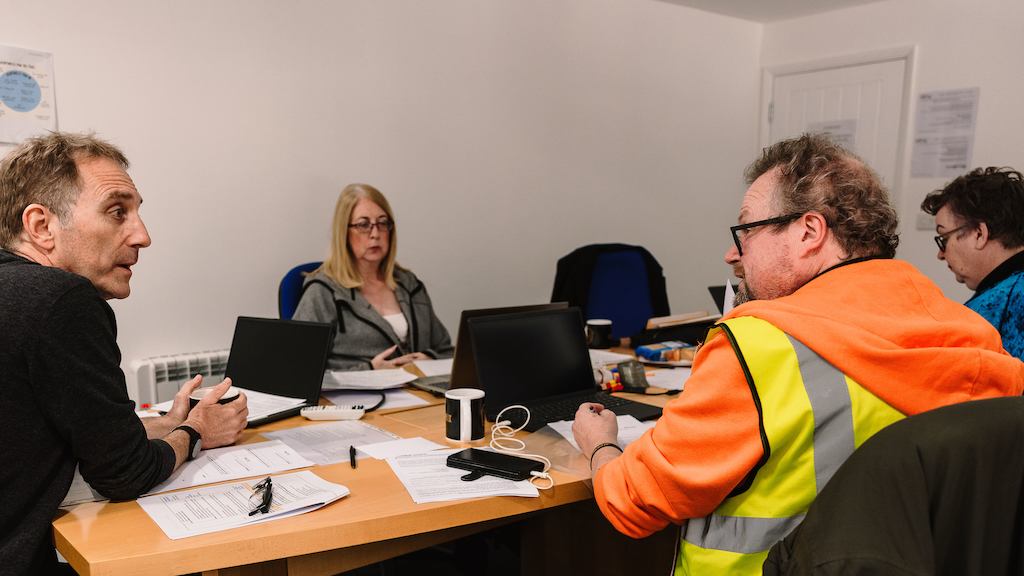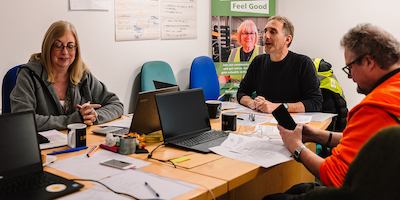The double prejudice facing Disabled older workers

The Centre for Ageing Better launches new report calling for new policy and practice to improve support for Disabled people and people with long-term health conditions in their 50s and 60s to find and stay in work.
The Supporting Disabled Older Workers Project has been published in time for National Inclusion Week, an annual event dedicated to celebrating inclusion and taking action to build inclusive workplaces.
Disabled older workers are almost twice as likely to experience negative treatment when applying for jobs or promotions than their non-disabled peers, new research from the Centre for Ageing Better published in National Inclusion Week reveals.
More than two in five (44%) Disabled people aged between 50 and 66 years old felt they had experienced negative treatment when applying for jobs or promotions in the past five years, compared to one in four (25%) non-Disabled people of the same age, the newly published Supporting Disabled Older Workers project report details.
Of all UK adults aged 50-66, more than two in three (69%) feel that older age is a disadvantage in the UK job market, the research project in partnership with The Policy Institute at King’s College London found. Three in four (75%) thought having disability or a health condition put applicants at a disadvantage.
Only around one in 20 (6%) UK adults 50-66 thought that having a disability or a health condition represented an advantage in the workplace while around one in ten (11%) thought being over 50 was an advantage.
Previous analysis has shown that the UK has a 50% higher rate of economic inactivity due to illness among people both aged 50-64 and who want to work compared to Germany.
Closing this gap would see around 192,000 additional older workers in the labour market, yielding approximately £13 billion in gross domestic product (GDP) a year and £2.5 billion in additional income tax and national insurance revenues.
The Supporting Disabled Older Workers project report, delivered by the Centre for Ageing Better and funded by Columbia Threadneedle Foundation, develops new policy and practice to improve support for Disabled people and people with long-term health conditions in their 50s and 60s to find and stay in work. It has been shaped by a nine-person “Experts by Experience” Steering Group of Disabled older people.
Workplace experiences shared by participants that highlight the barriers Disabled older workers face include:
- Being forced into retirement because employers were not open to reasonable adjustments to their roles
- Being rejected in interviews and job applications because of their long-term health conditions
- Workplace cultures that viewed requests for reasonable adjustments with suspicion and hostility
- Feeling obliged to step back into more junior roles with lower pay due to the limitations imposed by their health condition resulting in a reduced sense of worth
- Staying in existing job roles because of uncertainty around whether a new role would make the same accommodations they currently experience.
The report has a raft of recommendations for government and employers including:
- Employers should be supported and encouraged to consider the active involvement of Disabled older workers in shaping and co-producing workplace policies and practices.
- Employers should be supported and encouraged to consider ensuring Disabled older people feel confident in communicating their workplace needs, for instance by promoting the use of ‘adjustment passports’.
- Government needs to reform Jobcentre Plus and the National Careers Service, with a focus on culture, including specialist disability and age inclusive training.
- Government should commission further research on how to best reduce the burden on ‘sandwich generations’, for instance through reforms to childcare and social care.
John Holme, Experts by Experience Steering Group member, said:
I hope the report will help show employers that older and Disabled people can still offer real value in the workplace, especially when we are given the right support.
Rebecca Lines, Project and Change Manager for Work at the Centre for Ageing Better, said:
The UK labour market is failing Disabled older people. Among 50-64-year-olds, the employment gap rate between Disabled and non-Disabled people is more than 30 percentage points. Our new research highlights how age and disability discrimination often overlap, creating deeper disadvantages for these workers and making it harder to stay in jobs or find new opportunities.
“Disabled older workers told our researchers how they are navigating a constant minefield, weighing up whether to declare health conditions, how to ask for adjustments and how to present themselves in a labour market that often overlooks them or undervalues them. This takes a toll on confidence, wellbeing and long-term health, likely exacerbating the disadvantages they face.
“What is clear from this project is that employers and government cannot tackle the barriers facing Disabled older workers without working directly with them. This project has shown just how vital it is to listen to the voices of Disabled older workers to understand the challenges in a way that is impossible without lived experience.”
The report also lays bare the higher rates of dissatisfaction that Disabled older people are experiencing in their workplace.
The report’s survey shows that Disabled older workers report lower levels of satisfaction within their workplace compared to non-disabled people aged 50-66 including:
- With pay and progression (30% vs 40%)
- Training and development (39% vs 51%)
- Roles and responsibilities (51% vs 62%)
- Line managers (43% vs 55%)
Almost two in five (39%) Disabled people aged 50-66 said they did not feel their workplace was inclusive, compared to around one in four (23%) non-disabled people.
Concerns about stigma, being perceived as less capable, or becoming defined by their disability in professional settings meant many Disabled older workers do not ask their employers about reasonable adjustments that would help them carry out their roles more effectively.
Other research participants did not believe their employer would be able or willing to provide adjustments, for instance due to physical limitations in the workplace or due to overstretched teams
Among Disabled workers aged 50-66, one in five (21%) has not asked for adjustments in the past five years despite needing them.
Around one in three (30%) Disabled people reported a lack of confidence in asking for reasonable adjustments, compared to one in five (20%) non-Disabled people aged 50-66.
Elaine Smith, Deputy Director for Work at the Centre for Ageing Better, said:
Some participants in the research have found rewarding work with understanding and supportive employers. But other participants described a life dominated by the dual responsibilities of managing work and their health condition, leaving little room for joy outside work and resulting in a loss of social life. Flexibility is key and without it, Disabled older workers can struggle, finding it more difficult to manage their health or meet caring responsibilities.
“We know that there are employers out there who are the flexible and supportive organisations that allow Disabled older workers to thrive. We need more employers to see the opportunities here and to understand better what is standing in their way and stopping them from offering the culture and policies that would create the right working environment for Disabled older workers.”
Suzanne Hall, project lead on the research and Director of Engagement at the Policy Institute at King’s College London, said:
The intersection of age and disability can create barriers which keep people with so much to offer out of the workplace. Our research participants spoke about how hard it is to access the adjustments they are entitled to - that is, if they have the confidence to declare their disability in the first place.
“Yet, small changes could make a huge difference helping older Disabled people stay in work for longer, find new opportunities, and strengthen both their wellbeing and financial security – while also boosting the economy. But as this research shows, making these changes requires more than just listening. We must meaningfully involve Disabled older people at every step of the way. Only by genuinely co-designing new ways of working with Disabled older people will we be able to make a positive difference - and in a way that benefits us all.”
A nationally representative online survey was conducted through the survey provider Focaldata with 1,017 UK adults aged 50-66, weighted by sex, age and nation/region. The survey explored experiences of applying for jobs, asking for adjustments, job satisfaction, workplace culture and work–life balance.












